Dental Implant Oral Hygiene and Maintenance That Works
Learn essential dental implant aftercare tips to ensure a smooth recovery and long-lasting results after surgery.
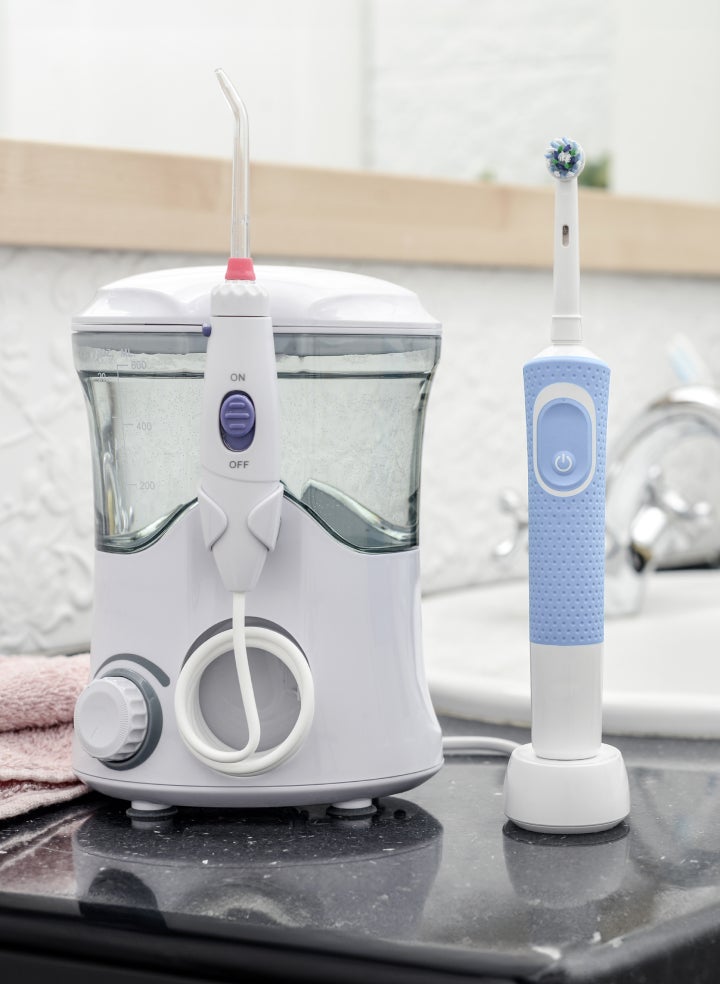
Dental implant oral surgery provides a fresh start for your smile, and dental implant hygiene is the key to keeping your smile healthy. At ClearChoice®, we're committed to making each patient feel prepared and confident every step of the way. From your oral surgeon consultation to at-home upkeep, we're here to provide clarity.
Dental implant care doesn't have to be difficult. Dental implant maintenance is all about taking daily actions and forming healthy habits. With the right regimen and routine, you can maintain the long-term success of your dental implants. Here's how to maintain your oral hygiene after your dental implants procedure.
Toothbrushes For Dental Implants
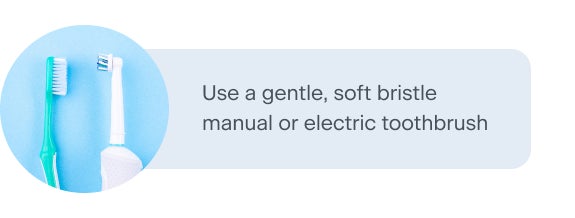
Brushing your teeth is the frontline of your dental hygiene, so you need the appropriate tool. The best toothbrush for dental implants is a soft bristled toothbrush.
As your implants aren't like your natural teeth, it's best to use a gentle, soft bristle manual or electric toothbrush. These types of brushes won't scratch the surface of your implants and will also help lessen risk of inflammation.
Small, tapered toothbrushes and interdental (or “proxy”) brushes are also good for implants. The design of these toothbrushes make them the right size and shape to keep your gum line clean and free of build-up. An interdental brush is also ideal for cleaning between your teeth, working in tandem with the right flossing technique.
Use gentle brush strokes around your implant site during your healing phase. Your dental implant placement can be delicate after your tooth replacement, so brush your teeth gently. Brushing too hard after your dental implant surgery risks loosening your implant.
Thorough brushing is imperative for the prevention of peri-implantitis. Peri-implant diseases are inflammatory disorders that impact the soft and hard tissues surrounding dental implants. They are caused by plaque and bacteria that build up around the base of the implant. Luckily, good oral hygiene can help lessen the risk of this from happening.
Be sure to brush your implants twice daily with a soft bristle manual or electric toothbrush.
Toothpaste For Dental Implants
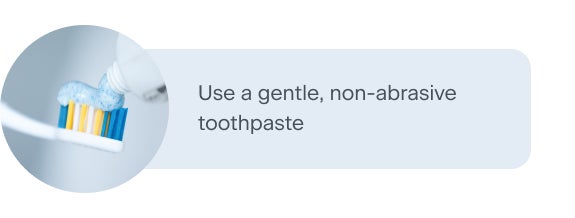
The best toothpaste for dental implants is a gentle, non-abrasive one. Because abrasive ingredients can damage the surface of your new teeth, it's best to choose a non-abrasive toothpaste. Avoid abrasive formulas like smoker's toothpaste, as well as toothpastes with baking soda and whitening agents.
As a rule, you should avoid all whitening toothpastes. Because your dental implants are made of different materials than your natural tooth enamel, the whitening formula won't penetrate. In addition to damage, products that contain hydrogen peroxide or carbamide peroxide can even discolor your crowns.
Please note that fluoride will not hurt your dental implants, and tartar control will help protect against peri implant diseases. Always check the ingredients, and check with your dentist to see which toothpaste may be right for you.
Dental Flosses for Dental Implants
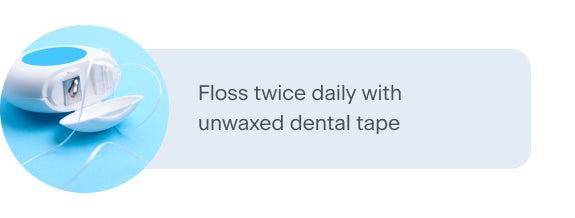
Floss twice daily to remove food stuck between your teeth at your implant site. Cleaning between your implants is crucial to protect their longevity. We recommend using unwaxed dental tape twice daily to clean between your implants.
Traditional waxed floss can scratch the surface of your dental implants, and leave behind waxy residue. The design and material of unwaxed dental tape eliminates these possibilities for a gentle flossing experience.
Oral Irrigation Systems for Dental Implants
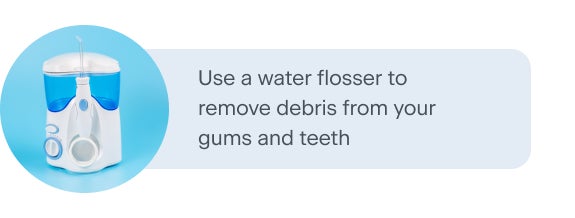
To take care of your oral health, it takes the right tools. Oral irrigation systems are incredibly effective at removing plaque and preventing plaque build-up.
We recommend using a water flosser. You can also use any other gentle oral irrigator to help control plaque build-up and gingivitis. Use these ideal tools to remove debris from your gums and teeth, without causing inflammation.
Mouthwash for Dental Implants
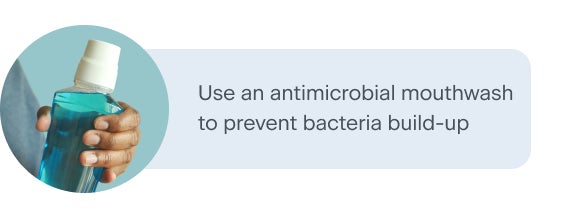
As an excess of plaque can lead to peri-implant diseases, mouthwash is a great help to your oral health. We recommend an antimicrobial mouthwash to lessen bacteria build-up. A gentle, alcohol-free antimicrobial solution is the best mouthwash for dental implants.
You'll want to avoid commercial mouthwashes with alcohol in their ingredients. Because most commercial mouthwashes are designed for "fresh breath", the alcohol content will dry out your mouth. This decreases your flow of saliva, making it harder to keep clean and increasing the chance of infection.
Healthy Habits and Choices
For dental implants to last a lifetime, routine care is the key. On top of brushing regularly, make sure you're flossing daily, at least twice per day, to give your new teeth the proper care. You should also make it a habit to visit your dentist twice a year. Regular cleaning appointments with your dental hygienist are a crucial component of your care routine.
Another important element of upkeep is your diet. We recommend that you avoid overindulging in sugar to decrease the risk of plaque build-up around your gums. You'll also want to avoid hard or sticky foods, which can cause damage to your implants, especially during your healing phase. Also, be sure to avoid using your dental implants to open packages or bottles.
You should also refrain from smoking and excessive alcohol consumption. Both of these substances may increase the risk of complications and infections.
Smoking can increase the risk of bone loss and hinder the osseointegration of your implants to your jawbone. In addition to the health risks, tobacco use can also discolor your crowns and ruin their aesthetic.
Alcohol use carries the same risk of hindering osseointegration. It can also constrict the blood vessels, delaying healing, and can dry your mouth to increase the risk of infection.
Oral health for dental implants doesn't have to be hard. Put these healthy routines and choices into practice, alongside the proper and recommended tools. With the right care and maintenance, you're sure to be smiling with your beautiful new teeth for a long time to come.
Frequently Asked Questions
What is the best type of toothbrush for dental implants?
Choose a gentle, soft bristle manual or electric toothbrush to lessen the risk of scratching and inflammation.
Can I use regular toothpaste on my dental implants?
Use a gentle, non-abrasive toothpaste and avoid those with baking soda, whitening agents, or designed for smokers.
How often should I floss my dental implants?
Floss twice daily with unwaxed dental tape to avoid scratching the implants.
Are oral irrigators safe for dental implants?
Yes, using an oral irrigator like a water flosser can effectively remove trapped food without causing inflammation.
What type of mouthwash should I use with dental implants?
Choose an alcohol-free, antimicrobial mouthwash to avoid dry mouth and lessen bacteria build-up.
What habits should I avoid to maintain my dental implants?
Avoid smoking, excessive alcohol consumption, sugary foods, and using implants to open packages or bottles.
